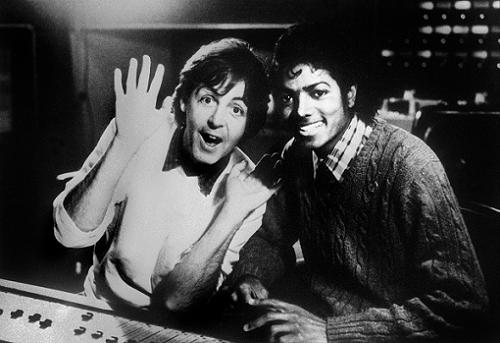It was during their collaboration on 1983’s “Say Say Say” that former Beatle Paul McCartney is said to have advised King of Pop Michael Jackson to invest some of his enormous wealth in music publishing. It was sound financial advice that McCartney may have come to regret giving on this day in 1985, when Michael Jackson purchased the publishing rights to the vast majority of the Beatles’ catalog for $47 million, outbidding McCartney himself.
To understand the sound business reasoning behind Jackson’s move to take control of the publishing rights to some 251 Beatles’ compositions, one must first understand some basic music-industry economics.
Every time a copyrighted recording is exploited for commercial purposes—played on the radio, for instance, or used in a movie or television commercial—the party that uses that recording is required to pay a licensing fee. A portion of that fee will be paid out to the record label that issued the recording, and the record label, in turn, will pay a portion of its share to the performer. Separately, a portion of the licensing fee is due to the writer of the song in question.
Songwriters—even those who are also performers—tend to enter into agreements with professional music-publishing companies to manage the collection of their songwriting royalties. In a typical arrangement, a publisher might take 50 percent of a songwriter’s royalties in exchange for handling collections and for actively promoting the commercial use of his songs.
John Lennon and Paul McCartney, the Beatles’ primary songwriters, did something slightly more complicated. The publishing agreement they signed was with a company of which they were also part owners. That company, called Northern Songs, Ltd., was formed in 1964 expressly to generate revenues from the growing catalog of Lennon-McCartney compositions. In this way, every sale or other commercial use of the song “Yesterday” earned Lennon and McCartney a songwriting royalty that they split with Northern Songs. And part of Northern Songs’ share would then come back to Lennon and McCartney as part owners of the company.
In 1969, the British company Associated TeleVision completed a messy and contentious takeover of Northern Songs, which in turn led Lennon and McCartney to pull out of their contract for future compositions and to sell off their own shares in the company. More than 15 years later, in 1985, as ATV prepared to sell its entire publishing catalog, Paul McCartney anticipated purchasing it himself, only to be thwarted by Michael Jackson, who was then at the peak of his financial power.
In the years afterward, that catalog—now estimated to be worth in excess of $1 billion—allowed Jackson to remain solvent by serving as collateral for several enormous personal loans that funded his extravagant lifestyle through years of low earnings and legal difficulties. In 2008, however, Jackson gave up his remaining interest in the catalog to Sony, one of his primary creditors.


